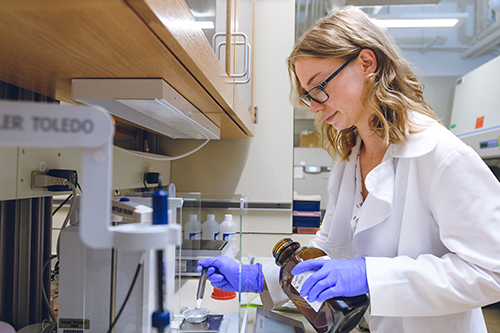Purdue Nutrition Science researcher uncovers connection between hormones, gut microbiome and metabolic dysfunction commonly seen in postmenopausal women
Written By: Rebecca Hoffa, rhoffa@purdue.edu

Tzu-Wen Cross (left) examines data in her lab.(Purdue University Photo/Rebecca Robiños)
Hot flashes are one of the most commonly discussed side effects of menopause, but the decline of ovarian hormones and its effect on the gut microbiome can also increase the risk of a variety of metabolic diseases, including obesity and cardiometabolic syndrome, according to a recent publication by Tzu-Wen Cross, assistant professor in Purdue University’s Department Nutrition Science.
The novel study is the first to show the link between the gut microbiome and loss of ovarian hormones in increasing inflammation and metabolic disease risk, which may be relevant in postmenopausal women. This study was published by Gut Microbes in December 2023 and conducted as part of a National Institutes of Health T32 Training Program in Translational Cardiovascular Science during Cross’ postdoctoral work at the University of Wisconsin-Madison’s Cardiovascular Research Center.
“I was very intrigued by the interactions between the gut microbiome and sex hormones, with a particular focus on the diseases prevalent among postmenopausal women,” Cross said. “When women go through menopause, the drastic loss of ovarian hormone production can significantly impact health. There’s a cascade of metabolic changes, often leading to conditions like obesity and other metabolic diseases.”
In the recent study, Cross and her collaborators used a preclinical mouse model to explore the effects of high-fat and low-fat diets in combination with ovarian decline on metabolic health. After finding differences in the low-fat diet groups due to the loss of ovarian hormones that were further exacerbated in the high-fat diet groups, Cross then investigated the impact of transferring the gut microbes into a sterile, or germ-free, mouse model. In this model, they saw that the microbes associated with ovarian loss caused more inflammation and weight gain, which suggested a connection between the sex hormones produced by the gonads, or reproductive organs, and the gut microbiota, or the microorganisms within the gut environment.
Since those initial projects, Cross has expanded her research to encompass dietary elements pertinent to both the gut microbiome and sex hormone equilibrium. She is exploring dietary compounds that can be modified by the gut microbiome, impacting not only metabolic health but also gonadal development and fertility. Of particular interest is S-equol, which is a bacterial metabolite of a soybean-derived isoflavone. This metabolite, produced solely by intestinal bacteria, occurs in only some — but not all — humans, potentially contributing to health disparities.
“The work we published in Gut Microbes laid the foundation for my independent research group, as we began connecting the gut microbiome with the brain and gonadal axis,” Cross said. “Many sex hormones are produced through signals initiated by the brain. When we have sufficient estrogen or testosterone in our bloodstream, our brain and pituitary gland communicate to our ovaries or testes to stop production. This is how our body maintains homeostasis. The opposite is true when hormone levels are insufficient; the brain signals for increased production.”
In postmenopausal women, Cross explained, there is a decrease in estrogen, so the brain continues to signal for more production, leading to elevated neuropeptide levels, but the malfunctioning ovaries fail to respond. A project funded by a Purdue Ralph W. and Grace M. Showalter Trust grant led the researchers to believe the gut microbiome may be able to respond to these neuropeptides and the elevated neuropeptide levels could potentially alter the microbiota. Then, when this microbiota is transplanted, it carries the signal to communicate with the gonads.
“We have discovered that various metabolites, some generated by the gut microbiota directly, are responsive to sex hormone changes. We’re now delving into understanding the connections between these metabolites and inflammation,” Cross said. “These compounds could be the mediator driving the phenotypes we observed between the gut microbiota and inflammation, and potentially have an impact on puberty development and fertility, so I’m starting to work with reproductive biologists trying to get down to look at the developmental impact of gut microbiota and their metabolites on fertility throughout a person’s life span.”

Anna Organski works on her research in Tzu-Wen Cross’ lab.(Purdue University Photo/Rebecca Robiños)
Ultimately, Cross and her lab, including College of Health and Human Sciences graduate student Anna Organski, hope to influence future probiotic treatments and dietary recommendations to help reduce metabolic disease risk and fertility issues.
“The gut microbiota can directly alter sex hormone homeostasis through potential gut-brain communication, which could be valuable for treatments and therapeutics for certain sex hormone-sensitive conditions,” Organski said. “Hopefully the information we discovered can be used to investigate further therapeutics for other diseases as well.”
Cross stresses the importance of considering the influence of the gut microbiome on health when making dietary choices to not only feed the appetite but the gut microbiome as well.
“Our gut microbiota can affect aspects such as metabolism, highlighting the potentially significant impact on our overall health,” Cross said. “By being mindful of how different foods can affect the microbiome, we can make informed decisions that support our well-being.”